|
|
|
Sort Order |
|
|
|
Items / Page
|
|
|
|
|
|
|
| Srl | Item |
| 1 |
ID:
110871


|
|
|
|
|
| Publication |
2012.
|
| Summary/Abstract |
Old-age income protection is provided in wealthy democracies by publicly funded defined-benefit pensions. Budgetary challenges have forced policy makers to consider private alternatives to these traditional systems. I consider the shortcomings of private saving arrangements in duplicating the advantages of public pensions. Some shortcomings can be overcome by introducing compulsory elements into private saving plans. Worker contributions into such plans could be mandatory; some or all worker accumulations in the plans could be converted to annuities at retirement; and workers' investment choices could be narrowly circumscribed. These restrictions do not eliminate the biggest weakness of private saving plans. Fluctuations in asset prices make it hard even for well-informed savers to select an affordable saving rate and an investment strategy that will assure decent income in old age. Public pension systems partly insulate workers against economic and financial market risks by sharing those risks broadly across workers, retirees, and taxpayers in multiple generations.
|
|
|
|
|
|
|
|
|
|
|
|
|
|
|
|
| 2 |
ID:
151234


|
|
|
|
|
| Summary/Abstract |
The challenge for Chile is to ensure that policy making and governance are democratized further.
|
|
|
|
|
|
|
|
|
|
|
|
|
|
|
|
| 3 |
ID:
147648
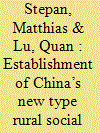

|
|
|
|
|
| Summary/Abstract |
This study explores the processes and outcomes of the public policy reforms from 2002 to 2014, targeting income security among the elderly for a segment of the Chinese population that was increasingly marginalised throughout the 1990s: the rural population. The authors reconstruct the policy process from 2002 until 2014 that led to the establishment of the New Type Rural Social Insurance Pension and assess its impact on providing adequate and sustainable old-age income. One particular focus is the study of the influence of international actors. Yet, as key to the success of the initiative, the authors identify the decisive support of the central level leadership, which facilitated the process by announcing a new development model and providing earmarked transfers from the central government. Despite the improvements in the income security of elderly rural Chinese, questions remain about the Chinese pension system’s long-term sustainability and the influence of the system’s fragmentation on social mobility and equality.
|
|
|
|
|
|
|
|
|
|
|
|
|
|
|
|
| 4 |
ID:
110872
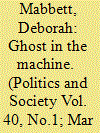

|
|
|
|
|
| Publication |
2012.
|
| Summary/Abstract |
The United States has introduced automatic enrollment into retirement savings schemes, and the United Kingdom is in the throes of doing so. The financial crisis has reminded us that returns on these schemes can be poor, even negative. Behavioral economics shows that people can be "nudged" into schemes regardless, but it also implies that the liberal account of market legitimation through informed choice cannot be applied. This article examines how risks are assigned in schemes and how enrollees might seek recourse if their expectations are disappointed. Comparing the United States and the United Kingdom, it argues that enrollees are more likely to seek recourse from the government in the United Kingdom. The explanation can be found in regulatory decisions that reflect the structure of each country's public pension scheme. This structure is conducive to private risk bearing in the United States, but not in the United Kingdom, suggesting that regulatory market liberalism is undermined by a residual approach to public provision.
|
|
|
|
|
|
|
|
|
|
|
|
|
|
|
|
| 5 |
ID:
110869
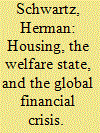

|
|
|
|
|
| Publication |
2012.
|
| Summary/Abstract |
Analyses of the global financial crisis that assign causality to the erosion of parts of the welfare state that protected individuals miss the importance of macro level regulation that protected firms and the financial system from itself. Post-Depression macro level regulation of finance prevented the emergence of mismatched maturities where deposits lacked state guarantees, and thus prevented runs on banks or near-banks. A balance sheet approach shows that macro regulation linked long duration liabilities in housing finance (mortgages) to long duration assets (pensions). Deregulation permitted the reemergence of mismatched maturities, providing both a necessary and sufficient condition for the current financial crisis.
|
|
|
|
|
|
|
|
|
|
|
|
|
|
|
|
| 6 |
ID:
110867


|
|
|
|
|
| Publication |
2012.
|
| Summary/Abstract |
This special issue of Politics & Society explores the relationship between social policy and financial markets, which was thrown into sharp relief by the financial crisis of 2007-09. The research asks how particular social policies underpin and even create financial markets, specifically mass markets for consumer finance, mortgages, and pensions.
|
|
|
|
|
|
|
|
|
|
|
|
|
|
|
|
| 7 |
ID:
160439


|
|
|
|
|
| Summary/Abstract |
This paper estimates the annual and present value of the future deficits of the Pay-As-You-Go (PAYGO) Civil Service and Social Security pension systems in Northern Cyprus. The historical and political context that led to their current design is reviewed. The quantitative analysis covers the period from 2015 until the last person now contributing retires and dies. The findings indicate that the system is not sustainable unless major reforms are implemented. Various parametric reform options are also assessed in this study. The estimated unfunded cost of these pension plans is found to be so large that none of these reforms alone is effective in fixing the fiscal imbalances already created. Structural reforms in the context of an overall income tax reform are needed to reduce the generosity of the pensions formula, increase in the age of retirement and increase the rates of contribution.
|
|
|
|
|
|
|
|
|
|
|
|
|
|
|
|
| 8 |
ID:
180231
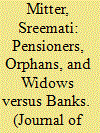

|
|
|
|
|
| Summary/Abstract |
This essay attempts to rectify the silence about the willful expropriation, by British and Israeli forces, of private Palestinian financial assets. Placing at its core the stories of ordinary Palestinians, it explores how they were robbed of their bank accounts, bonds, stocks, pensions, salaries, and safety deposit boxes during the creation and termination of the Palestine Mandate (in both 1917 and 1948). The essay argues that the basic financial structure of colonization, which deprives the colonized of the protection of sovereign banking institutions, facilitated these thefts. It also argues that the supposedly neutral rules of finance acted as a fig leaf to such dispossessions. Based on archival research and oral histories, it presents a new social history of finance that centers the experiences and subjectivities of non-elite Palestinians who strove to defend themselves and assert their rights, individually and collectively, during pivotal moments of violent upheaval and rupture.
|
|
|
|
|
|
|
|
|
|
|
|
|
|
|
|
| 9 |
ID:
143617


|
|
|
|
|
| Summary/Abstract |
During its 62 years of existence, the National Insurance Institute (NII) has undergone major changes, in line with the radical shifts in Israeli society, that have affected its special status, its functions, the policies it pursued, the organizational and managerial manner of its operation and other aspects of its activities. All these have had an immense impact on the wellbeing of the population as a whole and especially on the welfare of the weaker population groups. This article examines some major features of these changes, including the NII’s position within the governmental structure, the changing nature of public control over the organization, the shift in public attitudes toward its functioning, the protection of value of benefits in times of changing economic circumstances, the extent of its universal approach and its relationship with the insured population.
|
|
|
|
|
|
|
|
|
|
|
|
|
|
|
|
| 10 |
ID:
164413
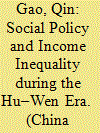

|
|
|
|
|
| Summary/Abstract |
The Hu–Wen era saw significant expansions in social policies in China. How did these policy changes affect income inequality, and did they leave a progressive legacy? Using the China Household income Project (CHIP) 2002, 2007 and 2013 data, this article offers empirical evidence to answer these questions. We find that these social policy changes indeed led to some convergence of the divided urban–rural–migrant social welfare systems and helped curtail the growing income inequality driven by market forces. Measured as the share in household final income, the size of urban social benefits decreased, while those for rural residents and rural-to-urban migrants increased from 2002 to 2013. Social benefits – especially pensions – reduced income inequality in all three groups, although to a much smaller extent for rural residents and migrants as compared to their urban peers. Rural residents also gained from agricultural and livelihood subsidies through the “Building a new socialist countryside” initiative.
|
|
|
|
|
|
|
|
|
|
|
|
|
|
|
|
| 11 |
ID:
182729
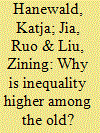

|
|
|
|
|
| Summary/Abstract |
This paper studies income inequality in old age and its development over the life cycle. We show that income is more unequally distributed in old age than in working age. We combine the regression-based inequality decomposition method and the three-step mediating effect test to analyze the transmission of income inequality from initial socioeconomic differences to income inequality in old age. Our study is based on a panel of over 4000 old households from the China Health and Nutrition Survey during 1991–2015. We find that the urban-rural gap and educational inequality are the primary causes of old-age income inequality. The effect of the urban-rural gap is partially mediated by educational inequality. Inequality accumulates with age and is reinforced in old age by the fragmented Chinese public pension system.
|
|
|
|
|
|
|
|
|
|
|
|
|
|
|
|
|
|
|
|
|